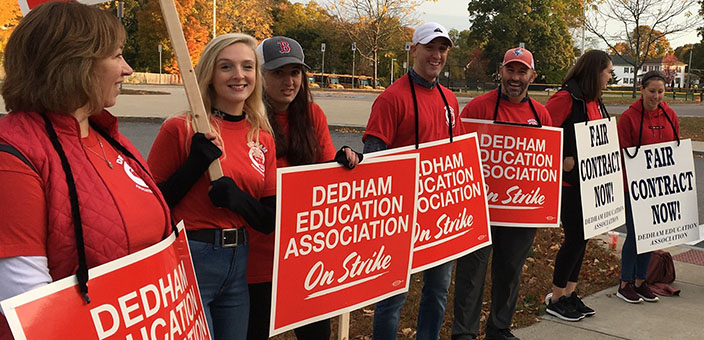Defying Injunction, Massachusetts Teachers Strike

Fines and jail time are possible consequences for defying the strike ban. Educators want lower health care costs and a stronger sexual harassment policy. Photo: Dedham Education Association
In Massachusetts, strikes are unlawful for public sector workers. That didn’t stop the Dedham Educators Association from walking out this morning after an overwhelming 248- 2 (out of 280 members) strike vote last night.
The educators in this Boston suburb are crying foul about health insurance costs that eat into their salaries, and district demands for more time on the clock and in professional development without any increase in compensation. Teachers are also demanding contract language that allows for real enforcement of sexual harassment policies.
“Most important to me is that my family is struggling because of the change in health insurance,” said Michael Medeiros, a high school teacher in Dedham. “We got hit with a $4,000 deductible. My daughters’ health concerns mean that I was hitting that $4,000 deductible every year. When the town changed the health insurance, they told us they would make the loss up in wage increases. But they are not doing that.”
Medeiros also spoke to the lack of an effective sexual harassment policy that can be enforced without conflicts of interest. He said that there have been a number of complaints that have not been addressed to the union’s satisfaction. The union wants language that makes complaints subject to the grievance procedure.
Anger had been brewing during two years of on-and-off bargaining. It spilled over when the district, which has not been to the table since August 1, insisted that it would choose which union negotiating team members would be allowed to attend a fact-finding hearing, and that those approved must use up one of their two annual personal days.
UNLAWFUL STRIKE
Massachusetts laws prohibit strikes and “inducing or condoning strikes.” The law has been used to stifle worker uprisings since the 1919 Boston police strike, when then-Governor Calvin Coolidge, soon to be the president, responded by outlawing strikes for public workers.
This history is personal in Massachusetts. People tell of grandfathers who never went back to work. On the picket line this morning, I heard Calvin Coolidge’s name more than I had in decades (and I live in his hometown).
Theresa Calderone, a paraprofessional at Dedham High School, talked about why she was supporting an unlawful strike. “I remember learning about that in eighth grade, Calvin Coolidge and the Boston police strike,” she said. “Even though I was only a kid it seemed so unfair to me. Why would policemen not have the right to strike? What makes policemen less than an IBEW member? Why are teachers less than tradesmen? It didn’t make sense to me, and when things don’t make sense to me I have to use my common sense.”

SUPPORT LABOR NOTES
BECOME A MONTHLY DONOR
Give $10 a month or more and get our "Fight the Boss, Build the Union" T-shirt.
Members were further incited to refuse the limitations of the law by Superintendent Michael Welch’s attempted character assassination of DEA President Tim Dwyer. The superintendent falsely claimed he had been to the bargaining table by stopping by Dwyer’s classroom. He also sent out what he called evidence of Dwyer’s poor leadership: a platform statement Dwyer wrote when he ran for leadership within the Massachusetts Teachers Association as part of the progressive caucus, Educators for a Democratic Union.
The platform—running seven pages of responses to questions posed by EDU—includes talk of rank-and-file organizing and taking on the privatization of public education. It says, “We do not need to win every fight. To put it bluntly, if we leave enough blood and teeth on the floor after the fight, the boss will be reluctant to engage us in conflict situations.”
The superintendent’s attack backfired. The membership, who had elected Dwyer, took the vote to strike and came out strong on picket lines to assert that this was a fight with the entire membership, not just with their president.
STUDENTS ON THE LINE
Student and community support is strong. High school student Daniel Pasciuto explained why he was on the picket line this morning: “I am here as a student to support my teachers. They need to feel safe. They need their health care. They need decent wages. Nothing would have been changed in history if some people hadn’t bent some laws. We might get in trouble, but it is a good type of trouble.”
Calderone, the paraprofessional, talked about what she had learned from the teachers as a fellow union member. “A few years ago when we needed support for our contract, these same teachers came out, when they didn’t have to, and set a good example and walked the picket line with us,” she said. “I am following their lead now.”
Cross-union support has been strong. The Massachusetts AFL-CIO, Electrical Workers (IBEW), nurses, and Teamsters have all been on the line, at rallies, and sharing their support on social media. Vermont Senator Bernie Sanders and Massachusetts Senators Ed Markey and Elizabeth Warren all released statement of support. And Massachusetts Representative Joe Kennedy, who is running for Senate against Markey, even showed up at a rally for a few minutes.
The district has filed with the Department of Labor Relations and obtained injunctions against Dwyer as president, Dwyer as an individual, and the DEA. If there is no settlement over the weekend and the workers remain out, fines and jail time are possibilities. Dwyer insists that the educators will not return to work until their demands are met.
Solidarity statements are coming in from across the country. Here in Massachusetts, years of being told we cannot strike are being upended by the courage of the DEA. As former president of the MTA, I hope educators answer this challenge with the same courage and solidarity I witnessed in Dedham today.





